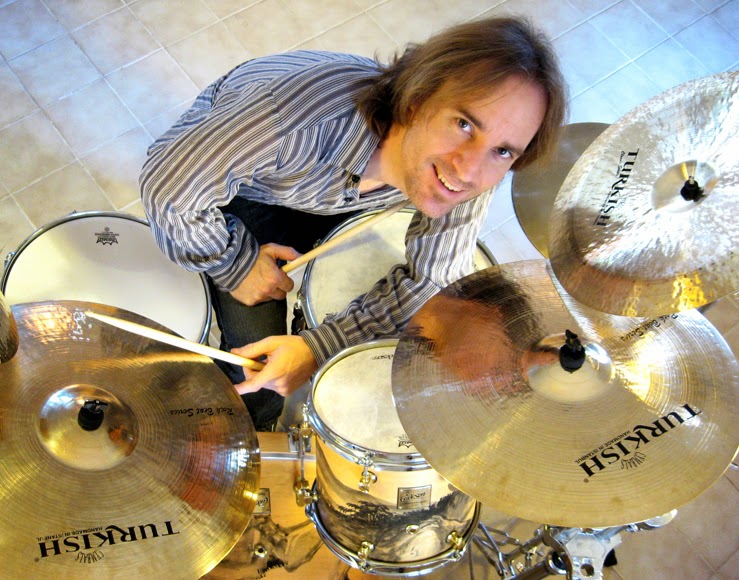
It's always nice when you go to a jazz performer's gig and find yourself equally impressed by the playing of their sidemen. That's how I first encountered bassist Boris Koslov. He was with the Misha Piatigorsky band, backing Mark Murphy at a NYC gig. My friend and I actually paid rapt attention during the bass solos!
I soon learned that there are many more sides to Boris' music. He performs with various configurations of the Mingus band, generally on Monday nights at Jazz Standard. (Often you can find him playing Mingus' own lion-headed bass.) He's been involved in the popular BeatleJazz project and is co-leader of Opus V, along with Alex Sipiagin, Seamus Blake, Dave Kikoski and Donald Edwards. (Allow me a little plug for the latter: they've just done a second recording for Criss Cross and will be touring in August.) Among the many other jazz artists he's worked with are Jaleel Shaw, George Colligan, Bobby Watson, James Moody, Benny Golson, Donny McCaslin, Brian Lynch, Ray Vega, Eddie Palmieri, Michel Petrucciani, Michel Legrand, Joe Locke, Mark Whitfield, Jeff 'Tain' Watts, Robin Eubanks and Urszula Dudziak.
In spite of being such a busy guy, Boris answered my usual two questions, during a break between sets by the Mingus Big Band.
1. What made you decide on a career in music?
Rather hard question because I made the decision
when I was 15. I just loved the way it
felt and I just loved the way the music made me feel and I always thought that,
if it makes me feel so good maybe if I can learn to play it and, you know,
change something to the way I feel I can make other people feel better. Also I kind of felt that it connects people. By the time I was 15, we had a program in
Soviet Union, when you would enter the competition and you could enter college
before finishing your high school after the 8th grade. Then you would finish your high school while
in college, while already getting a professional education. So, I wanted to play bass guitar and at the
same time, I was really into another connecting type of hobby or potential
career, which was transportation, in particular, railroad. I had to make a decision when I was 15 basically,
and I thought I made the right one, because now I am on the plane and train so
much that sometimes now I’m wondering if it’s still my hobby or not. But I thought it was initially all about
connecting people.
2.
What is it you love about jazz that made you
decide to focus on that type of music?
It was the love of jazz definitely. But when I say jazz, I really mean the love
for the time-based music, because I think most of the music that comes out of
folklore: African, Caribbean, Indian,
funk and everything that we know as pop and jazz music in the American music;
it’s all time-based. The notes matter
less than the rhythm. That’s the key
that’s what interestingly enough oftentimes is being overlooked during the jazz
education process, as I see it. And it
took me a while to realize that, but it’s that initial attraction that really
made me move towards jazz. I was
attracted to rock and roll as many young kids initially. We had a very scarce supply of rock and roll
or jazz things back in Soviet Union, and I was also really into Dixieland and
Louie Armstrong and whatever my father had in the house. It’s just the groove or the rhythm that really
got me. And later on, it was the level
of conversation that potentially happens with other players and subsequently,
the audience, that got me really attracted eventually in '91 to the decision to
move to New York and try myself out, where it was basically to learn how to
better groove and deal with time and how to better communicate. I
found myself as sort of like hitting a wall a little bit, because I was invited
to play with all the best bands at the young age of 22/23. They put me "Number 1" Young Jazz Musician, and
I knew that I was very green, very raw.
That’s what decided on my career in New York, as opposed to staying in
my hometown of Moscow.
You can get a good idea of Boris Koslov's marvelous bass technique by watching this video:
http://www.youtube.com/watch?v=6yZ67KvDFX8.







